5 books about Bourdaghs, Michael K.
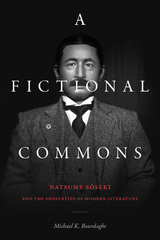
A Fictional Commons
Natsume Soseki and the Properties of Modern Literature
Michael K. Bourdaghs
Duke University Press, 2021
Modernity arrived in Japan, as elsewhere, through new forms of ownership. In A Fictional Commons, Michael K. Bourdaghs explores how the literary and theoretical works of Natsume Sōseki (1867–1916), widely celebrated as Japan's greatest modern novelist, exploited the contradictions and ambiguities that haunted this new system. Many of his works feature narratives about inheritance, thievery, and the struggle to obtain or preserve material wealth while also imagining alternative ways of owning and sharing. For Sōseki, literature was a means for thinking through—and beyond—private property. Bourdaghs puts Sōseki into dialogue with thinkers from his own era (including William James and Mizuno Rentarō, author of Japan’s first copyright law) and discusses how his work anticipates such theorists as Karatani Kōjin and Franco Moretti. As Bourdaghs shows, Sōseki both appropriated and rejected concepts of ownership and subjectivity in ways that theorized literature as a critical response to the emergence of global capitalism.
[more]
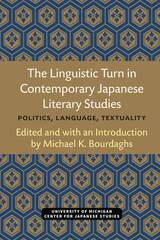
The Linguistic Turn in Contemporary Japanese Literary Studies
Politics, Language, Textuality
Edited and with an Introduction by Michael K. Bourdaghs
University of Michigan Press, 2010
The 1970s and 1980s saw a revolution in Japanese literary criticism. A new generation of scholars and critics, many of them veterans of 1960s political activism, arose in revolt against the largely positivistic methodologies that had hitherto dominated postwar literary studies. Creatively refashioning approaches taken from the field of linguistics, the new scholarship challenged orthodox interpretations, often introducing new methodologies in the process: structuralism, semiotics, and phenomenological linguistics, among others. The radical changes introduced then continue to reverberate today, shaping the way Japanese literature is studied both at home and abroad.
The Linguistic Turn in Contemporary Japanese Literary Studies is the first critical study of this revolution to appear in English. It includes translations of landmark essays published in the 1970s and 1980s by such influential figures as Noguchi Takehiko, Kamei Hideo, Mitani Kuniaki, and Hirata Yumi. It also collects nine new essays that reflect critically on the emergence of linguistics-based literary criticism and theory in Japan, exploring both the novel possibilities such theory created and the shortcomings that could not be overcome. Scholars from a variety of disciplines and fields probe the political and intellectual implications of this transformation and explore the exciting new pathways it opened up for the study of modern Japanese literature.
[more]
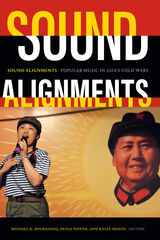
Sound Alignments
Popular Music in Asia's Cold Wars
Michael K. Bourdaghs, Paola Iovene, and Kaley Mason, editors
Duke University Press, 2021
In Sound Alignments, a transnational group of scholars explores the myriad forms of popular music that circulated across Asia during the Cold War. Challenging the conventional alignments and periodizations of Western cultural histories of the Cold War, they trace the routes of popular music, examining how it took on new meanings and significance as it traveled across Asia, from India to Indonesia, Hong Kong to South Korea, China to Japan. From studies of how popular musical styles from the Americas and Europe were adapted to meet local exigencies to how socialist-bloc and nonaligned Cold War organizations facilitated the circulation of popular music throughout the region, the contributors outline how music forged and challenged alliances, revolutions, and countercultures. They also show how the Cold War's legacy shapes contemporary culture, particularly in the ways 1990s and 2000s J-pop and K-pop are rooted in American attempts to foster economic exchange in East Asia in the 1960s.Throughout, Sound Alignments demonstrates that the experiences of the Cold War in Asia were as diverse and dynamic as the music heard and performed in it.
Contributors. Marié Abe, Michael K. Bourdaghs, Paola Iovene, Nisha Kommattam, Jennifer Lindsay, Kaley Mason, Anna Schultz, Hyunjoon Shin, C. J. W.-L. Wee, Hon-Lun (Helan) Yang, Christine R. Yano, Qian Zhang
Contributors. Marié Abe, Michael K. Bourdaghs, Paola Iovene, Nisha Kommattam, Jennifer Lindsay, Kaley Mason, Anna Schultz, Hyunjoon Shin, C. J. W.-L. Wee, Hon-Lun (Helan) Yang, Christine R. Yano, Qian Zhang
[more]
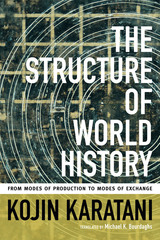
The Structure of World History
From Modes of Production to Modes of Exchange
Kojin Karatani
Duke University Press, 2014
In this major, paradigm-shifting work, Kojin Karatani systematically re-reads Marx's version of world history, shifting the focus of critique from modes of production to modes of exchange. Karatani seeks to understand both Capital-Nation-State, the interlocking system that is the dominant form of modern global society, and the possibilities for superseding it. In The Structure of World History, he traces different modes of exchange, including the pooling of resources that characterizes nomadic tribes, the gift exchange systems developed after the adoption of fixed-settlement agriculture, the exchange of obedience for protection that arises with the emergence of the state, the commodity exchanges that characterize capitalism, and, finally, a future mode of exchange based on the return of gift exchange, albeit modified for the contemporary moment. He argues that this final stage—marking the overcoming of capital, nation, and state—is best understood in light of Kant's writings on eternal peace. The Structure of World History is in many ways the capstone of Karatani's brilliant career, yet it also signals new directions in his thought.
[more]
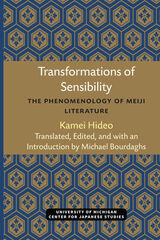
Transformations of Sensibility
The Phenomenology of Meiji Literature
Kamei Hideo; Translated, edited, and with an introduction by Michael Bourdaghs
University of Michigan Press, 2002
First published in Japan in 1983, this book is now a classic in modern Japanese literary studies. Covering an astonishing range of texts from the Meiji period (1868–1912), it presents sophisticated analyses of the ways that experiments in literary language produced multiple new—and sometimes revolutionary—forms of sensibility and subjectivity. Along the way, Kamei Hideo carries on an extended debate with Western theorists such as Saussure, Bakhtin, and Lotman, as well as with such contemporary Japanese critics as Karatani Kōjin and Noguchi Takehiko.
Transformations of Sensibility deliberately challenges conventional wisdom about the rise of modern literature in Japan and offers highly original close readings of works by such writers as Futabatei Shimei, Tsubouchi Shōyō, Higuchi Ichiyō, and Izumi Kyōka, as well as writers previously ignored by most scholars. It also provides a new critical theorization of the relationship between language and sensibility, one that links the specificity of Meiji literature to broader concerns that transcend the field of Japanese literary studies. Available in English translation for the first time, it includes a new preface by the author and an introduction by the translation editor that explain the theoretical and historical contexts in which the work first appeared.
[more]
READERS
Browse our collection.
PUBLISHERS
See BiblioVault's publisher services.
STUDENT SERVICES
Files for college accessibility offices.
UChicago Accessibility Resources
home | accessibility | search | about | contact us
BiblioVault ® 2001 - 2024
The University of Chicago Press









